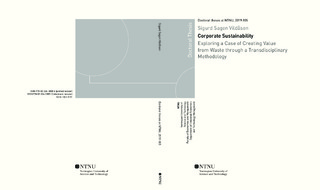| dc.contributor.advisor | Fet, Annik Magerholm | |
| dc.contributor.advisor | de Boer, Luitzen | |
| dc.contributor.advisor | Aspelund, Arild | |
| dc.contributor.author | Vildåsen, Sigurd Sagen | |
| dc.date.accessioned | 2019-08-20T06:42:28Z | |
| dc.date.available | 2019-08-20T06:42:28Z | |
| dc.date.issued | 2019 | |
| dc.identifier.isbn | 978-82-326-3809-3 | |
| dc.identifier.issn | 1503-8181 | |
| dc.identifier.uri | http://hdl.handle.net/11250/2609240 | |
| dc.description.abstract | Summary of the thesis
This thesis draws from a longitudinal case study focused on the company Plasto’s effort to create value from waste. Taking place from May 2014 to April 2018, the empirical research explores the drivers and barriers of introducing recycled materials in the production of plastic components. Conceptual research has taken place in parallel and aims to engage with the scientific discourse in the field of corporate sustainability.
The case study’s unit of analysis is the perceived conflicting requirement between product quality and recycling of materials. This tension has led to a process of organizational learning through which Plasto’s representatives have shared experiences in dialogue with actors from other organizations. The practical result is that the primary customer, AKVA group, has agreed to the use of recycled materials in specific product types, and the technical testing indicates that quality requirements can be fulfilled.
An essential feature of the transdisciplinary approach concerns the role of interaction between practitioners and researchers. The case study exemplifies specific activity links through the relationship development between Plasto and the involved researchers. The company’s principal representative in the process has openly communicated the lessons learned, reflecting a situation where the central actors of a change process negotiate the underlying tension between quality and circularity.
A theoretical implication of the findings surrounds the role of different actors in an ongoing change process. The classical stakeholder concept tends to focus on the focal firm, as represented by its managers, which underestimates dynamic relationships between individuals and groups. Thus, the thesis proposes a framework that explains the role of actor interaction and how activity links and resource ties shape realization of social and environmental concerns in business operations.
The thesis asserts a transdisciplinary methodology where academics and practitioners jointly frame problems and co-create knowledge. The resulting insights lay the groundwork for further debates in the field of corporate sustainability on the role of different actors, for example, those with non-financial purpose in knowledge development. Such an approach places emphasis on the researcher’s role as a mediator between the scientific discourse and the actor-specific societal discourse. | nb_NO |
| dc.description.abstract | Sammendrag av avhandlingen
Avhandlingen baserer seg på en langsgående case-studie om selskapet Plasto sitt forsøk på å skape verdi av avfall. Den empiriske forskningen fant sted i perioden fra mai 2014 til april 2018 og utforsker drivere og barriere når det kommer til bruk av gjenvunnet materiale i produksjon av nye plastkomponenter. Konseptuell forskning ble gjennomført i parallell med mål om å bidra til den vitenskapelige debatten i fagfeltet knyttet til næringslivets bærekraft.
Case-studien fokuserer på den opplevde motsetningen mellom produktkvalitet og bruk av gjenvunnet materiale. Denne spenningen har ført til en læringsprosess hvor Plastos representanter har delt erfaringer i dialog med aktører fra andre organisasjoner. Det praktiske resultatet er at selskapets viktigste kunde, AKVA group, har gått med på å bruke gjenvunnet materiale i spesifikke produkttyper. Videre har tekniske undersøkelser vist at det er mulig å håndtere kvalitetskravene.
En sentral del av avhandlingens transdisiplinære framgangsmåte er interaksjonen mellom forskere og praktikere. Case-studien eksemplifiserer dette gjennom hvordan ulike aktiviteter formet relasjonen mellom Plasto og forskerne som var involvert. Selskapets hovedrepresentant formidlet læringspunkter underveis, som gjenspeiler en situasjon hvor de sentrale aktørene i en endringsprosess forhandler om den underliggende spenningen mellom kvalitet og sirkulær økonomi.
En teoretisk implikasjon av de empiriske funnene går på rollen til ulike aktører i en endringsprosess. Det klassiske interessent-konseptet har en tendens til å fokusere på en sentral bedrift, representert gjennom ledernivået, som dermed undervurderer den dynamiske relasjonen mellom individer og grupper. Av den grunn så foreslår avhandlingen et rammeverk som forklarer rollen til aktør-interaksjon, og hvordan aktivitetskoblinger og ressursbindinger former sosiale og miljømessige forhold i en bedrifts daglige drift.
Avhandlingen påpeker og illustrerer betydningen av en transdisiplinær metodologi hvor akademikere og praktikere sammen utvikler problemstillinger og kunnskap. Den tilhørende innsikten legger grunnlaget for videre diskusjon i fagfeltet knyttet til næringslivets bærekraft, og spesielt hvordan aktører som ikke har et finansielt formål kan bidra i kunnskapsutviklingen. Videre så understreker framgangsmåten viktigheten av at forskere evner å megle mellom den vitenskapelige kunnskapsutviklingen og den mer aktør-spesifikke samfunnsdebatten. | nb_NO |
| dc.language.iso | eng | nb_NO |
| dc.publisher | NTNU | nb_NO |
| dc.relation.ispartofseries | Doctoral theses at NTNU;2019:105 | |
| dc.relation.haspart | Paper 1: Vildåsen, Sigurd.
Lessons learned from practice when developing a circular business model. I: Designing for the circular economy. Routledge 2019 ISBN 9781138081017. s. 316-325 | nb_NO |
| dc.relation.haspart | Paper 2: Vildåsen, Sigurd.
Corporate sustainability in practice: An exploratory study of the sustainable development goals (SDGs). Business Strategy and Development 2018 ;Volum 1.(4) s. 256-264
https://doi.org/10.1002/bsd2.35 | nb_NO |
| dc.relation.haspart | Paper 3: Vildåsen, Sigurd; Havenvid, Malena Ingemansson.
The role of interaction for corporate sustainability. The IMP Journal 2018 ;Volum 12.(1) s. 148-170
- This article is published under the Creative Commons Attribution (CC BY 3.0)
https://doi.org/10.1108/IMP-05-2017-0016 | nb_NO |
| dc.relation.haspart | Paper 4: Vildåsen, Sigurd; Keitsch, Martina; Fet, Annik Magerholm.
Clarifying the Epistemology of Corporate Sustainability. Ecological Economics 2017 ;Volum 138. s. 40-46
https://doi.org/10.1016/j.ecolecon.2017.03.029 | nb_NO |
| dc.title | Corporate Sustainability : Exploring a Case of Creating Value from Waste through a Transdisciplinary Methodology | nb_NO |
| dc.type | Doctoral thesis | nb_NO |
| dc.subject.nsi | VDP::Social science: 200::Economics: 210 | nb_NO |
